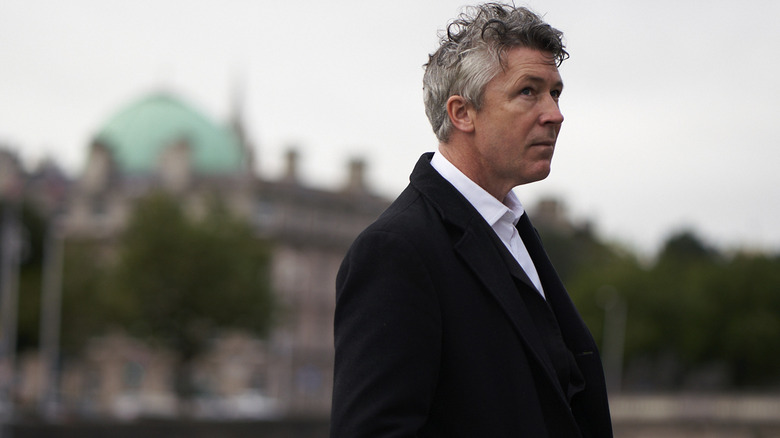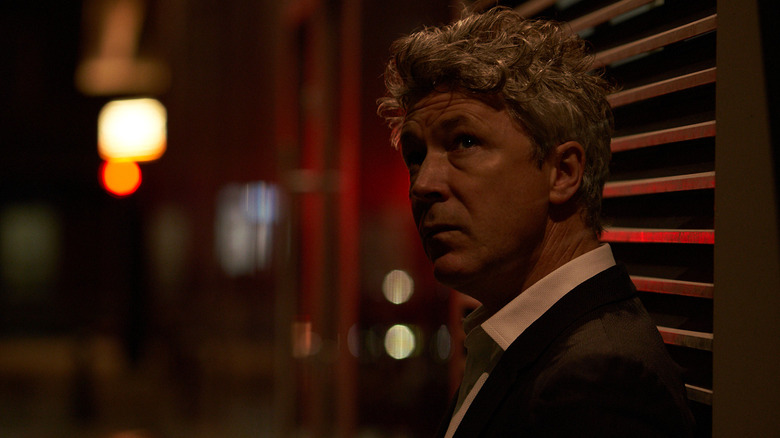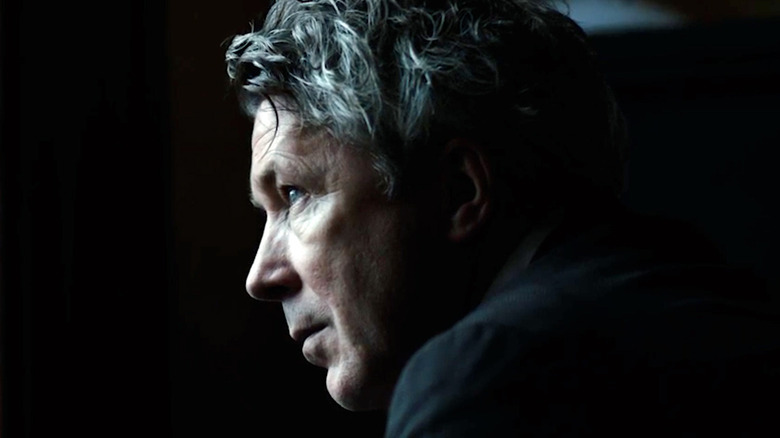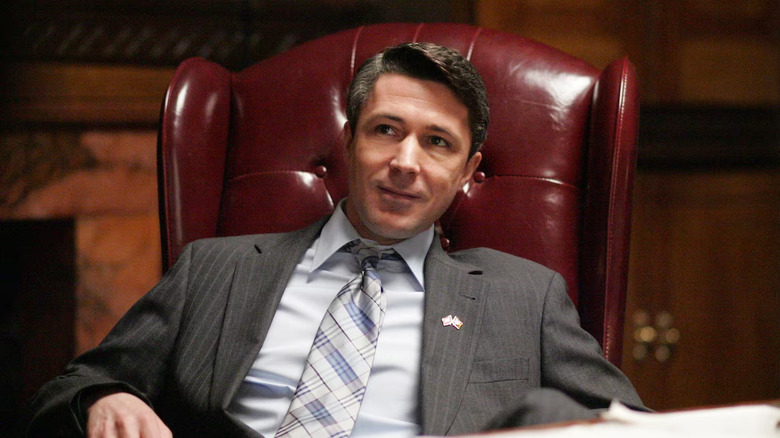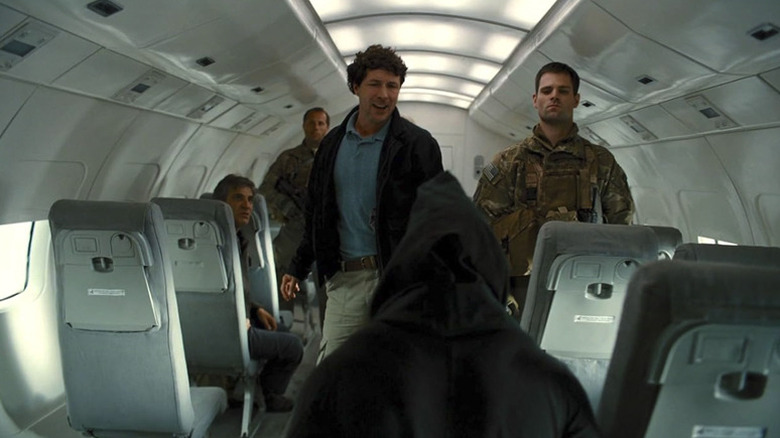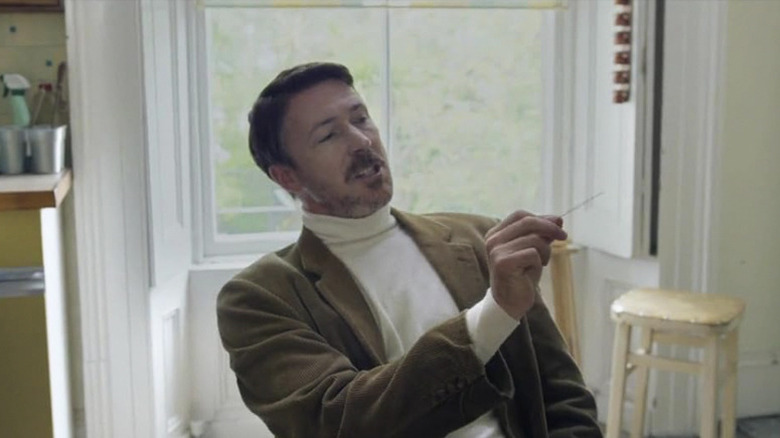Barber's Aidan Gillen On Playing A Private Eye And Memories From Game Of Thrones And The Wire [Exclusive Interview]
Judging by its trailer, "Barber" is the story of a private investigator out to find a missing girl. A down-and-out protagonist, in over his head, stumbles onto a larger conspiracy that goes all the way to the top. If you've seen it once, you've seen it a thousand times, right? Not necessarily.
That may be the spine of "Barber," but half of the story is a family drama. The titular PI has a loving relationship with his teenage daughter, and is trying to navigate how to raise her with his ex-wife. And instead of being set in the seedy streets of Los Angeles, the neo-noir capital of the world, this one's set in Ireland, a locale that's far from typical for this subgenre. Those two elements are enough to make this movie stand out from its contemporaries.
Add to that the fact that Aidan Gillen, the wonderful character actor from "Game of Thrones," "The Wire," and tons of other films and TV shows you know and love, plays the lead here, and you know you're in good hands.
Since this film was a fully international and independent production outside the realm of the ongoing SAG-AFTRA strike, I was able to sit down with Gillen over Zoom and talk to him about joining a long line of cinematic private eyes and his appearances in everything from "Peaky Blinders" to "Sing Street."
Note: This interview has been lightly edited for clarity and brevity.
'We're talking about these basics, which actually make things really personal'
There's a long onscreen lineage of private investigators who stumble on a larger conspiracy, and you've even played a hard-boiled detective before in "Killers of the Cosmos." What does it feel like to have joined those ranks in a more grounded way with a project like "Barber?"
Yeah, really good actually. It was something I hadn't really thought about too much until we — myself and a few friends, who ended up making the film, and shooting the film, and acting in the film — were like, "Let's do something in Dublin at night, because we have a great DP, we've got our own camera, and the streets are there. Let's do it." We weren't entirely sure of what we were going to do. When the idea came up of the detective thing, I thought it was almost, I was like, "Really?"
But we all were around the same age and had grown up watching, primarily, the TV detectives at the time, like "Colombo," "The Rockford Files," "Kojak," "Streets of San Francisco," and many others. They weren't all American ones, but those were the ones that I'd remembered. As I got older, of course, going back to — even before I discovered noirs, it was the neo-noirs, "Chinatown" or whatever, which, for me, was a really old film. This was 1974, and it's set in 1930-whatever. So the whole concept of that being a neo-noir, or then "L.A. Confidential" after it, or "Angel Heart," which was one of my favorites in that field, made by Alan Parker in, I think, about '86, and then finding the other ones later. It was an honor to be going there, but definitely an unexpected trip.
Our favorite versions of these — and Elliott Gould, of course, was brilliant [in "The Long Goodbye"], playing that quite hapless, ambling, shambling, kind of like Colombo, or even Joaquin Phoenix in "Inherent Vice," which I thought that was a great detective. We didn't go anywhere near the shagginess of that, not on something like this. But I thought, "Yeah, okay, I'm a bit like that already, so I'll just..." With the instruction, "Go over to your wardrobe there, and get at it. You wear the same shirt and jacket all the time. Let's do that. That's very old school. Have you got a white shirt? Have you got any shoes?"
We're talking about these basics, which actually make things really personal. You think about it all the time, but you're not overthinking things, and you're not thinking about the wrong things. Sometimes you're thinking about different things, though, than you might normally. You've got your dialogue ... and you're seen with the other character, but because you're on the streets you grew up on, or walking around, it's full of memories. Sometimes that's what you're thinking about during the scenes. Which is good, because that's what those characters would be doing.
'It can't be just a case of a missing girl'
You mentioned the word "personal" there, and that was a big thing that stuck out to me about "Barber." Half of this movie is a quiet family drama, which made it feel pretty different than a lot of other private investigator mysteries. Was that family dynamic part of what drew you to this?
I'd say that we didn't have the script at the start of deciding, "Let's do something, let's make it a noir-y, gumshoe detective in Dublin, contemporary, because we haven't seen that before." Then when Fintan Connolly, who directed it, and his wife Fiona, who co-wrote it and she produced it, were talking about the family thing and all the rest of it, there was more of it than I thought there was going to be. But I think you need it, because I had been also adamant that it can't be just a case of a missing girl. Then that is just an episode of an episodic TV detective. They're great, but that wasn't what we were supposed to be doing.
My contribution was that we've got to see people at home. We've got to see people thinking, got to see people not talking. It informs — I thought it was a warm relationship. What was unsaid was interesting. What he isn't able to say. His communication skills aren't amazing. The daughter was trying, she's frustrated. It was real enough, but I felt like the relationship between that family and the ex-wife, my ex-wife, and our daughter, was the art of it.
You really saw that this is someone who does care. This is the kind of person who will go out of his way to try and find a girl who's in trouble, even though that wouldn't be my standard assignment. It would be more mundane. As he says himself, it's insurance jobs, or this or that. It's not as heavy-duty as that. It was important to see this is somebody who cares, but also has regrets about the things he didn't do, or didn't say, or gotten wrong. It's trying to make that right for somebody else.
Yeah, it's the kind of thing that really humanizes a character who could otherwise just be an archetype. So you reunited with Fintan for the first time in many years on this. Do you think you've changed as an actor over that stretch, between projects with him?
Yeah, definitely. I would change all the time, I'd like to think. That can be positive. It can be negative. I do feel like I try to change it up. I think when you're younger, you do a lot. You try to do a lot. "I really have to tell everyone what's going on here." Whereas through the years of working on film, or TV, or theater, and I always did love writers, but the words and the pictures do a lot of the work. If you overplay into that, it looks wrong. Under-doing it can be, if it's too under, can be quite tricky.
I would say I'm definitely different from the person who would've met Fintan years ago, and I would generally try and do a bit less. Because I think there's a point you get to where you don't have to do anything, but you've got to prepare. You really prepare. I did a theater show here recently with just tons, and tons, and tons of monologue. I spent a year learning it so I could forget it.
Wow.
I thought, I'm just going to learn all of this, and then I'm just going to try and say it conversationally, really conversationally. There's loads of it, and it's quite dynamic, and it goes places you don't expect. So I've been trying to learn how to be a better actor all my time, since I've been 13. I care more about it now. When I was 13, I wouldn't have even asked those questions, or been able to tell you what was good or not. I certainly wouldn't have been amazing. But the people were amazing, and the process was amazing.
I remember having a guy coming in and giving us a workshop in this youth theater I was in, on Stanislavski and the Method and all this, and we were 13, 14. I was like, "I have absolutely no idea what this guy's talking about." He's taking a piece of paper, cutting a hole in it, and holding it up onto Marlon Brando's hands in "On the Waterfront" as he takes off a glove, and puts it on. Are we all supposed to do that now? I got what he was [going for]. I know that it's good to do things. I've learned that, you know what I mean? Everyone knows that one, but now it might be, "Oh, yeah, well, if I just make a cup of coffee during this scene, I'm not going to be thinking about what I'm saying. I'm going to be thinking about how to do that. Then the other stuff will [come naturally]." I suppose that's a very long answer to trying to do a bit less, and I am different. Probably not as different as I'd like to be, and I hope to be different in the future.
'I learned a lot about America'
I think "The Wire" was the first project that I first saw you in as an actor, and I'm curious if you learned anything from that experience that you took forward with you for the rest of your career.
Well, I learned a lot. I learned a lot about America, and American politics, and local government politics, what a city like Baltimore is like. Because I was there for a long time: Three seasons at seven months apiece, or whatever. Just in terms of, dialogue was never changed. Those scripts were written, [and] were timed. They wouldn't let you change a word. That was something that happened on "Game of Thrones," as well. Very difficult to get them to change a word. You really had to go through the process and consult the writers.
I was like, "Why?" "Because we timed it. If someone puts in an extra line there, this really good line down here is going to go." There was one character, Felicia Pearson, who played Snoop, was allowed improv. Because it was so good. I think she was dyslexic. I don't even know how good a reader she was. I don't know, but there were certain hall passes. Yeah. I suppose I knew what I was getting into, and there was a lot of truth, and integrity, and non-showbiz stuff about that. But even "Game of Thrones" felt like that. HBO were good at that. It felt like in the old days, to get a lead part in a TV show, you had to be conventionally or really handsome. It's like "CHiPs." It's like Erik Estrada and [Larry Wilcox]. You had to look like a movie star. HBO kind of reversed that with stuff like "The Sopranos," and "The Wire," and "Game of Thrones." Suddenly it was just people — interesting people.
So not showing off, no messing, not asking for too much. There was a lot of that. David Simon was one of the guys behind "The Wire" — the main guy, I would suggest, behind "The Wire" — said, "Yeah, everyone thinks they've not got enough to do in this, but we think all this stuff through and every one of these characters are necessary. We have this much time, we've got 60 episodes, everyone's going to get plenty to do. Just wait. Wait your patience, and play your moments well, because that's what's important. It's not like having a massive speech, it's just whatever you're doing in this scene, it's what you're doing."
I suppose I was kind of familiar with it before anyway, just the small pieces of storytelling, just thinking of things as jigsaw pieces, or pieces of a puzzle. I had been thinking about that just before I came to "The Wire," actually. I got cast in "The Wire" out of a play, a Harold Pinter play I was doing on Broadway called "The Caretaker." It was quite difficult to decipher what was going on, but I embraced that and just thought, I'm going to present all these different pieces and then at the end maybe we'll put them together. I was thinking that way. I definitely thought that way on "Game of Thrones." It's small pieces, just little pieces of a big mosaic.
I was wondering about "Game of Thrones." Did [showrunners] David [Benioff] and Dan [Weiss] ever tell you about a possible direction they might take with Littlefinger, only to eventually change their minds and go on a different path?
Not much. I don't think we had many conversations like that. There was stuff that was in the books that was mostly there. Then, when it moved beyond that, they didn't really give too much away. I went to them plenty of times, but I wouldn't ask too many questions, because I didn't want to know. It's nice not to play the future, because then you're playing it. "The Wire," you came in every week, you got it, you didn't know what was going to happen. That was reflecting real events in Baltimore, also. "Game of Thrones" was similar. I think maybe they might give you three [scripts] at the start of the season, then they'd trickle in. But I just found it's nice not to — if you don't know the end game, you don't play it. Although, there were certain things that did happen that I thought, Well, I thought that was going to happen. Then as far as deaths or anything like that, go, well, that was easy. You get a phone call from somebody who never rings you up, and you go, "Well, I know what this is," and it doesn't bother me at all. I've been dying in things since I was like 20. [laughs]
'No one could really hear anything because of the IMAX camera'
I also wanted to ask you about "The Dark Knight Rises." There have obviously been a ton of memes that have sprung forth from that film, but you had the opportunity to hear Tom Hardy's Bane voice before the rest of the world. I was just curious about what your first reaction was when you heard what he was doing with that character.
Well, I couldn't hear it. No one could really hear anything because of the IMAX camera, which was heavily whirring, like a washing machine. He had the mask on. He hadn't really decided what it was going to be yet, and I couldn't hear. I have mixed feelings — it's a great film to be part of, and I wish the circumstances had been a little different for myself. I could have done a better job if I just knew a little more about what was what. But I'm not going to knock it. When I did hear it, I thought it was pretty interesting. I kinda based a character accent on the same guy that I think he might've based his original Bane voice on, but it sounds quite different. It's a [self-proclaimed] gypsy boxer called Bartley Gorman.
Oh, that's interesting. I don't think I've ever heard about that. [Note: /Film has actually written about this before, but I missed this one.]
I'd read somewhere that Tom had been studying this guy, Bartley Gorman, who was a bare-knuckle gypsy in England. Then I did "Peaky Blinders" and Tom was in it, and one of my first scenes was actually with him. I was doing my [version] — and I studied this guy also, because I thought it's subtle, and it's strange, and it just sounds old-fashioned, and it just sounds properly gypsy. But Tom didn't mention it. He was too busy being Hasidic, Alfie Solomons. But, great actor.
'I was living, practically, on Sing Street'
"Sing Street" is one of my favorite movies, full stop. I really love that film. What was that experience like for you, working on that one?
Okay, that was interesting because I was living, practically, on Sing Street. Sing Street is a real street in Dublin, and I was, at the time, living on a house just around the corner. The kids from the school used to go past my house every day, and I used to talk to the kids. I would've loved to have been in it more. It's not a film about the adults. The adults are ineffectual, and they're wrong, and they're either foolish, they're alcoholics, they're — every adult in the film gets it wrong, apart from the big brother who's becoming an adult, but he's going kind of down, you know?
So in a way, that gave all of these kids something to fight against, to say, "This is bulls***, we're going to [stand up to this]." I wish I was 17 and I was in it, because that was my era. I grew up in those times, listening to those bands. I did go to bands. I wasn't in bands, but I went to see a lot of bands. That was totally a bit like my own life, apart from being in the band, but everything — the clothes, the same kind of school. It was nice to be part of, I just wish I had more. Anyway, next time. [laughs]
You've worked with Taylor Sheridan a couple of times now, and he seems like he's in a class of his own when it comes to pumping stuff out that people love to watch. When you've collaborated with him, has there been something that you've noticed about the way that he approaches the work that's different than other directors or showrunners that you've worked with?
Well, he kind of, it's like what he looks like. He looks like a rancher, or a maverick. He does do things his own way, for sure. Some of it's now been city, urban-centered, but the early stuff wasn't. He's a man of the land. An American man of the land. It's very blunt. I don't mean that in a negative way, it was just, he'll cast somebody, and just say, "Well, you do it." It's a bit like Clint Eastwood, probably. "It's just faster. Go get in the car and drive it." There's not tons and tons of detailed character talk. I think he casts who he wants, and kind of lets them get on.
But his work rate is crazy. He's got so many things going on. They're all things that people didn't particularly think would get made, or that people would watch, or that there was an audience. People didn't think "Yellowstone" would get that huge. He's got several series on. I like him. I didn't see him so much last time around. I've been in and out of "Mayor of Kingstown," his show with Jeremy Renner, and I'm going back to it. I should be there now, but then with the strike, I'm just waiting. I'll come back into it with a bit more going on.
But there's a bunch of people around, who have a kind of consistence. I did a thing with him called "Those Who Wish Me Dead," and a lot of the people who worked on that worked on "Wind River," a lot of them worked on "Mayor of Kingstown." There's a lot of trust — same directors, a lot of the same actors. Maybe that's how you can run four or five shows, because you know that stuff is probably in safe enough hands. You've got to still keep an eye on it. But as for knocking at those scripts, I have no idea. Maybe when you've spent years as a jobbing actor, and suddenly it's happening, you're going to hit it. But it's kind of phenomenal work, right?
"Barber" arrives in theaters and On Demand on September 22, 2023.
